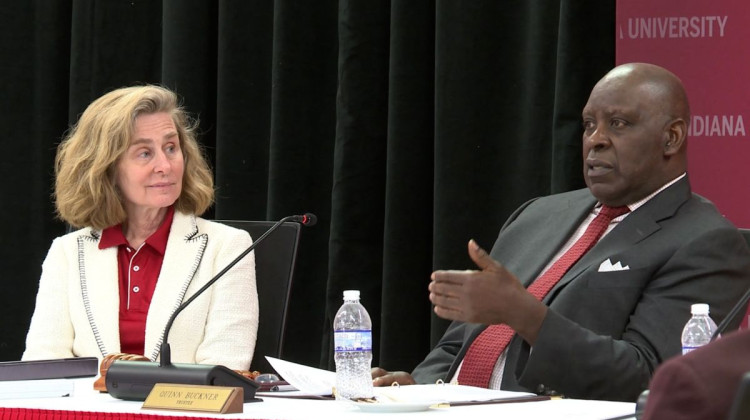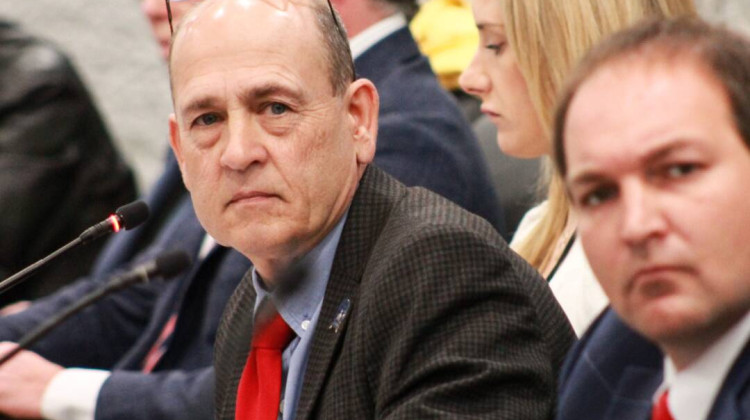
Gov. Mike Braun would be able to remove alumni-elected members of Indiana University's Board of Trustees according to the final state budget.
Devan Ridgway / WTIU NewsGov. Mike Braun could remove and replace alumni-elected members of Indiana University’s Board of Trustees at any time in provisions of the state’s budget bill introduced quietly Wednesday night by the Republican majority.
The provisions eliminate alumni election of three of IU’s nine trustees and makes them appointments of the governor. The General Assembly will vote on the 215-page budget Thursday night.
The board governs the university’s mission, financial plans, policies and facilities.
Braun said the current process at IU hasn’t “yielded the proper results.”
“I want to get a board there that is going to be maybe a little more rounded, that's going to produce better results,” Braun said. “I think that we're going to have a different configuration. That doesn't mean that an alumni wouldn't be on it as one of the picks that you'd have to constitute the board. It would just mean that it's not required for those three slots.”
Minority Caucus leader Sen. Shelli Yoder (D-Bloomington) said the changes are a “direct attack on the independence of one of our state’s premier public universities.” Yoder said IU belongs to the people of Indiana, not one politician.
“Sneaking this power grab into the final pages of a 200-plus page budget—without public input or legislative debate—is not just bad governance, it’s dangerous,” Yoder said. “Stripping alumni of their voice on the Board of Trustees and giving the governor unchecked control undermines the very principles of shared governance and academic freedom.”
Senate President Pro Tem Rodric Bray (R-Martinsville) said “practically speaking, a very small fraction of the IU alumni” have participated in Board of Trustee elections, about 2.5 percent last year. IU reports it has more than 790,000 alumni.
“Because the number is so small, it is not a fair representation and therefore not what the drafters intended,” Bray said. “Many trustees across our public universities are selected by our governor, so this is a logical change."
Mark Land, a trustee candidate and former IU senior administrator, called the changes disturbing and disappointing.
“The governor already has the power to hand-pick two-thirds of the board,” Land said. “So effectively, the role of the alumni trustees is really nothing more, quite frankly, than to provide a diversity of opinion and to give the alumni base some voice.”
An IU spokesman said the university is “currently reviewing the potential impacts of the proposed state budget.”
Braun’s control over IU trustees would expire in 2028.
Land said lawmakers are concerned about “intellectual diversity” on college campuses, but this change seems to promote the opposite. He said trustees make better decisions with debate and diversity.
“The more debate we have, and the more we bring in diverse perspectives, the better off the resulting ideas are,” Land said. “Something like this is just going to shrink the diversity of views, right? It shrinks the spectrum of what is heard and discussed and how things are handled.”
Yoder also criticized Republican lawmakers for “inserting themselves into every corner of our institutions—from classrooms to boardrooms.”
“You can’t claim to stand for limited government while trying to control it all,” Yoder said.
Alumni vote on one trustee each year, and elections open on June 1.
Six candidates are running this year.
Changes to trustees only apply to IU, but other aspects of the budget will impact all higher education institutions.
Universities will see a 5 percent decrease in their budgets.
The budget also makes faculty governance organizations at public Indiana universities purely advisory, stripping away power from the organizations’ decisions and votes. At IU, faculty councils share governance with IU trustees and university leaders.
The budget also impacts post-tenure review. The budget states universities must measure faculty’s productivity for tenure reviews and promotions.
The General Assembly has changed faculty tenure review before, such as through Senate Enrolled Act 202. SEA 202 requires faculty to teach “intellectually diverse” ideas and foster free expression or risk losing tenure.
This story has been updated to include comments from Gov. Mike Braun and Sen. Rodric Bray.
Aubrey is our higher education reporter and a Report For America corps member. Contact her at aubmwrig@iu.edu or follow her on X @aubreymwright.
 DONATE
DONATE






 Support WFYI. We can't do it without you.
Support WFYI. We can't do it without you.